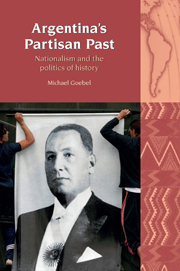Book contents
- Frontmatter
- Contents
- Acknowledgements
- List of acronyms and abbreviations
- Introduction
- 1 Argentina's two pantheons: from mitrismo to revisionism
- 2 Between co-optation and opposition: Peronism, nationalism and the politics of history, 1943–55
- 3 The deepening polarisation: the proscription of Peronism and its politics of history, 1955–66
- 4 The apogee of revisionism: nationalism, political violence and the politics of history, 1966–76
- 5 New narratives for a new era? Shifts, decline and resurgence of nationalist constructions of the past since 1976
- Conclusion
- Glossary
- Bibliography
- Index
5 - New narratives for a new era? Shifts, decline and resurgence of nationalist constructions of the past since 1976
- Frontmatter
- Contents
- Acknowledgements
- List of acronyms and abbreviations
- Introduction
- 1 Argentina's two pantheons: from mitrismo to revisionism
- 2 Between co-optation and opposition: Peronism, nationalism and the politics of history, 1943–55
- 3 The deepening polarisation: the proscription of Peronism and its politics of history, 1955–66
- 4 The apogee of revisionism: nationalism, political violence and the politics of history, 1966–76
- 5 New narratives for a new era? Shifts, decline and resurgence of nationalist constructions of the past since 1976
- Conclusion
- Glossary
- Bibliography
- Index
Summary
Introduction
Tired of the manifest incompetence and corruption of Isabel Perón's government, the majority of the population greeted the coup of March 1976 with ‘relief’, as both the liberal English-language daily Buenos Aires Herald and the British ambassador pointed out. Although the regime quickly proceeded to cut itself off from civil society and politicians, closed down congress and, worst of all, embarked on a ferocious campaign of state terror, large segments of public opinion were prepared to put their faith in the dictatorship and its claim that its real purpose was to restore a fully fledged representative democracy in accordance with Argentina's republican values. It is a commonly held view that the dictatorship, self-styled as a proceso de reorganización nacional, was primarily the result of decades of nacionalista agitation. But the implicit support lent to the regime by the silent majority and by a ‘liberal’ press steeped in a visceral anti-Peronism was just as important in making possible the disappearance of thousands of left-wing activists, sympathisers and uninvolved bystanders as were the extreme right's calls for even tougher action in the so-called ‘war against subversion’. Criticism of the military regime was no doubt muted by (self-)censorship and a stifling climate aimed at the depoliticisation of society, but endorsement of the ‘dirty war’ and other government policies often went well beyond what was required for political survival. This was clearest in the jingoistic celebration of the ‘recovery’ of the Falkland Islands in April 1982, which gripped almost the whole of Argentine society and apparently surprised even president Leopoldo Galtieri, who had ordered the military expedition – which was soon defeated.
- Type
- Chapter
- Information
- Argentina's Partisan PastNationalism and the Politics of History, pp. 181 - 229Publisher: Liverpool University PressPrint publication year: 2011

